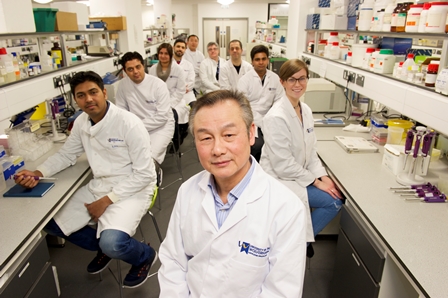.jpg)
Researcher to investigate alcoholism drug to treat pancreatic cancer
University of Wolverhampton researcher, Professor Weiguang Wang, has been awarded more than £73,000 by Pancreatic Cancer UK to investigate the effectiveness of using a treatment for alcoholism, Disulfiram, to treat pancreatic cancer.
There are currently very few treatments for the disease, and a shocking five per cent of people survive for five years or more after diagnosis.
More than 400 people die from pancreatic cancer in the West Midlands on average every year. Survival rates for pancreatic cancer have barely improved for the past 40 years. Despite this, over the last decade only 1% of total UK cancer research spend has been dedicated to the disease.
Over the next year, Professor Wang’s team will be looking at Disulfiram, and whether it can be used to effectively treat pancreatic cancer. Disulfiram can be used to kill cancer cells, but it can only itself survive in the bloodstream for around four minutes.

Professor Wang said that if his team is able to develop a new delivery system which allows Disulfiram to stay in the bloodstream for longer periods of time, then they could test how effective the drug is at killing pancreatic cancer cells.
“We’re very pleased our research has been chosen for funding and that we’ll be able to continue our work with Disulfiram and test its effectiveness in treating pancreatic cancer.
“Current treatment options for pancreatic cancer are limited, and most patients diagnosed with the disease have a poor prognosis. This is an extremely promising area of investigation and if we’re successful, could lead to new options to improve outcomes for people with pancreatic cancer,” Professor Wang said.
The grant has been awarded as part of Pancreatic Cancer UK’s fourth annual Research Innovation Fund (RIF) grants scheme.
This year the charity has awarded more than £500,000 to seven pancreatic cancer researchers based in institutions throughout the UK.
The core aim of the Pancreatic Cancer UK Research Innovation Fund is to spur creative and cutting edge ideas and approaches in pancreatic cancer research, including those that have shown promise in other areas of cancer research.

Funding like this, which allows a researcher to investigate a new direction of research, may make all the difference in finding new pieces of the puzzle, leading to a better understanding of pancreatic cancer, and ultimately a better chance of patients being diagnosed earlier and living longer with the disease.
Chief Executive of Pancreatic Cancer UK, Ms Alex Ford, said she’s thrilled that the charity is able to back such innovative and promising research taking place in the UK to fight pancreatic cancer. To date Pancreatic Cancer UK has invested more than £2 million to the scheme.
“Pancreatic cancer is a tough disease which historically has been sidelined in terms of crucial research funding. We’re so proud to be leading the way in tackling this by investing in world-leading research at the cutting edge of science, to uncover the breakthroughs we so desperately need to transform the future for people affected.
“We’re extremely excited to be working with Professor Wang and his team, and we are confident that this project has the potential to make an important contribution to our quest to take on pancreatic cancer together,” Ms Ford said.
The announcement coincides with Pancreatic Cancer Awareness Month, a national campaign which runs throughout the month of November, which will see people in Wolverhampton coming together to spread the word about the disease.
For more information about Pancreatic Cancer UK or the Research Innovation Fund, please visit www.pancreaticcancer.org.uk/research
For more information please contact the Corporate Communications Team.


/prod01/wlvacuk/media/departments/digital-content-and-communications/images-2024/Diane-Spencer-(Teaser-image).jpg)
/prod01/wlvacuk/media/departments/digital-content-and-communications/images-18-19/220325-Engineers_teach_thumbail.jpg)
/prod01/wlvacuk/media/departments/digital-content-and-communications/images-2024/241024-Dr-Christopher-Stone-Resized.jpg)
/prod01/wlvacuk/media/departments/digital-content-and-communications/images-2024/UoW-City-Campus-(Teaser-Image).jpg)
/prod01/wlvacuk/media/departments/digital-content-and-communications/images-2024/241014-Cyber4ME-Project-Resized.jpg)
/prod01/wlvacuk/media/departments/digital-content-and-communications/images-2024/240315-Research-Resized.jpg)
/prod01/wlvacuk/media/departments/digital-content-and-communications/images-2024/WMCA-event-(teaser).jpg)
.jpg)
.jpg)